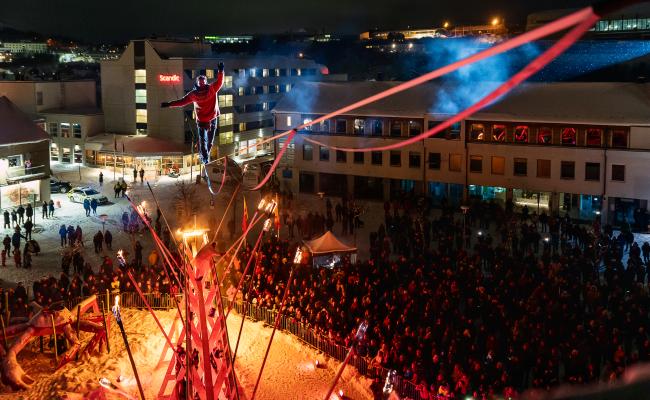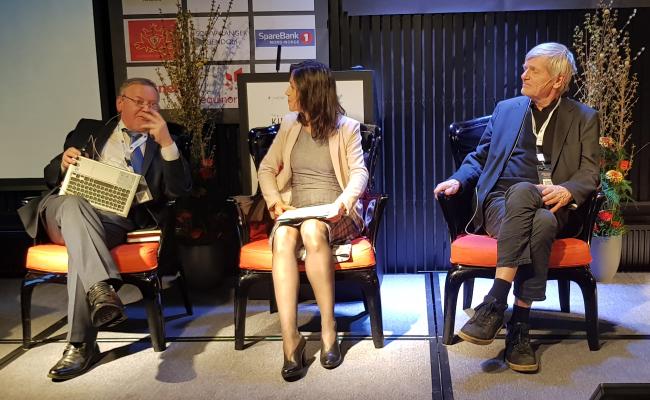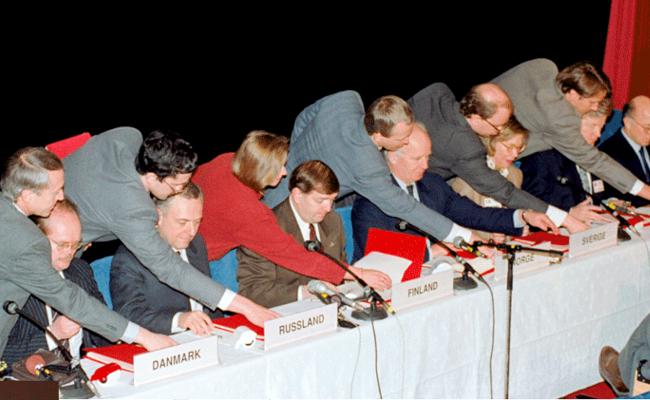The Kirkenes Conference 2023 Finland's MFA: The Barents Cooperation Has Had a Reneissance
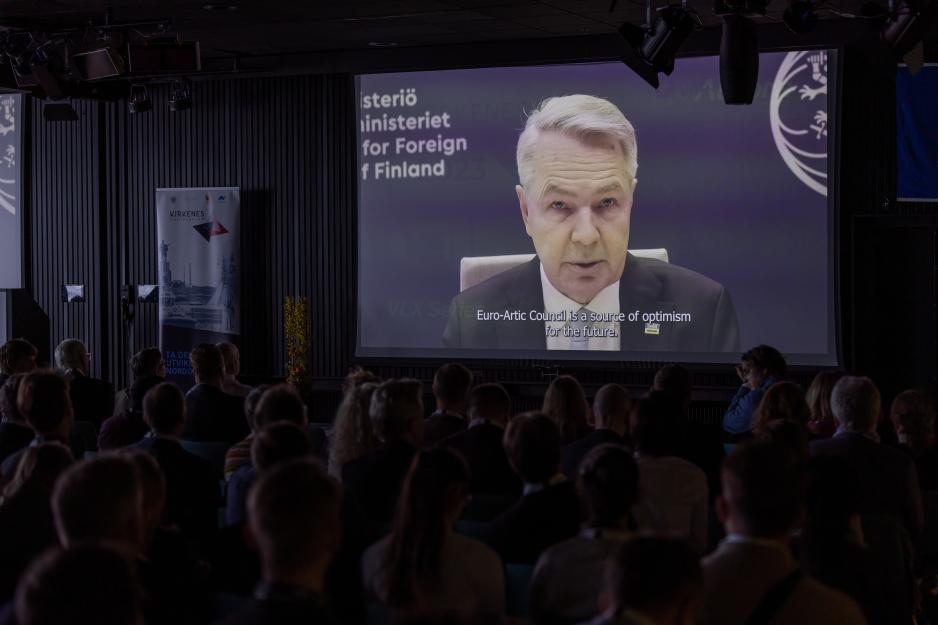
Finnish MFA Pekka Haavisto (the Green Party) digitally participated in the Kirkenes Conference. (Photo: the Norwegian Barents Secretariat)
Kirkenes: The Barents Cooperation is very meaningful, also without Russia, and it has flourished again through increasingly engaged Nordic members, asserts Finland's MFA Pekka Haavisto at the Kirkenes Conference.
The Barents cooperation turns 30 years this year – and both its past, present, and future, have been central topics during this week's Kirkenes Conference in Northern Norway, close to the border with Russia.
The Russian warfare against Ukraine has led to a halt in all cooperation activities with public institutions in Russia and has made people-to-people cooperation with the Russian side very difficult. However, the war has not put a stop to the Barents cooperation between Finland, Norway, Sweden, and the other members Denmark, Iceland, and the EU, emphasizes the Finnish Minister of Foreign Affairs Pekka Haavisto.
"Contrary to what has been sometimes claimed, our work has not lost its purpose with the suspension of Russia. The Barents cooperation has experienced a renaissance that has galvanized the activity of the remaining members, who are more dedicated than ever to deepening and reinforcing the collaboration," says Haavisto in a digital presentation at the conference on Wednesday.
Finland has the chairmanship of the Barents Euro-Arctic Council and stood at the forefront for continued cooperation without Russia.
"The continuity of the Barents cooperation is very important, as it has been one of the cornerstones of regional cooperation in the Arctic, and it remains a meaningful priority area for Finland. The Barents cooperation operates under a unique format that includes member state capitals, local communities, as well as citizens of the Barents region. The Barents cooperation also acknowledges the role of indigenous peoples and the region’s youth, which is essential for a sustainable long-term development of the Barents region," Haavisto points out.
No celebration, but strong commitment
“This year marks the 30th anniversary of the Barents cooperation, and we had initially hoped to commemorate this impressive milestone with a high-level meeting. Under the current circumstances, with a war of aggression being waged by Russia, a member of the Barents Euro-Arctic Council, such festivities would not be appropriate. Nevertheless, the commitment of the other members of the Barents Euro-Arctic Council is a source of optimism for the future,” asserts the Finnish MFA and continues:
“Furthermore, I am proud to say that the Finnish Presidency has not only succeeded in implementing the Presidency programme as planned, but we have also completed an additional initiative, namely the Barents Green Transition Concept Paper, which was recently presented in Kemi, Finland. Therefore, we can without doubt say that the Barents cooperation is thriving in its current format, and that the cooperation will continue without Russia for as long as the political circumstances do not give us reason to think otherwise”.
The new Nordic enthusiasm or flourishing of the Barents cooperation is confirmed by the Swedish MFA Tobias Billström (Moderates), who also participated digitally in the Kirkenes Conference.
"We will continue the Barents cooperation in a Nordic format. The Barents cooperation is an example of what can be achieved when nations meet and work together on specific issues as equals," says Billström.
Something to be proud of
"To strengthen peace, stability, welfare, and sustainable development by building relationships across national borders and developing mutual understanding is still the main goal of the Barents cooperation. Much of the cooperation's strength lies in its ability to function at multiple levels. Cooperation at the working group and expert level and close interaction between stakeholders at the national, regional, and local level are at its core," highlights Billström in line with his Finnish colleague.
The Swedish MFA points at, among other things, rescue cooperation with regular exercises, revised transport plans for the region, and the climate action plan as illustrative of the value of the Barents cooperation.
"At the same time, more must be done. Joint efforts on civil protection, supply security, health and social issues, as well as reliable border-crossing infrastructure, is also necessary in order to make the Barents region an attractive place to live and work in," he says.
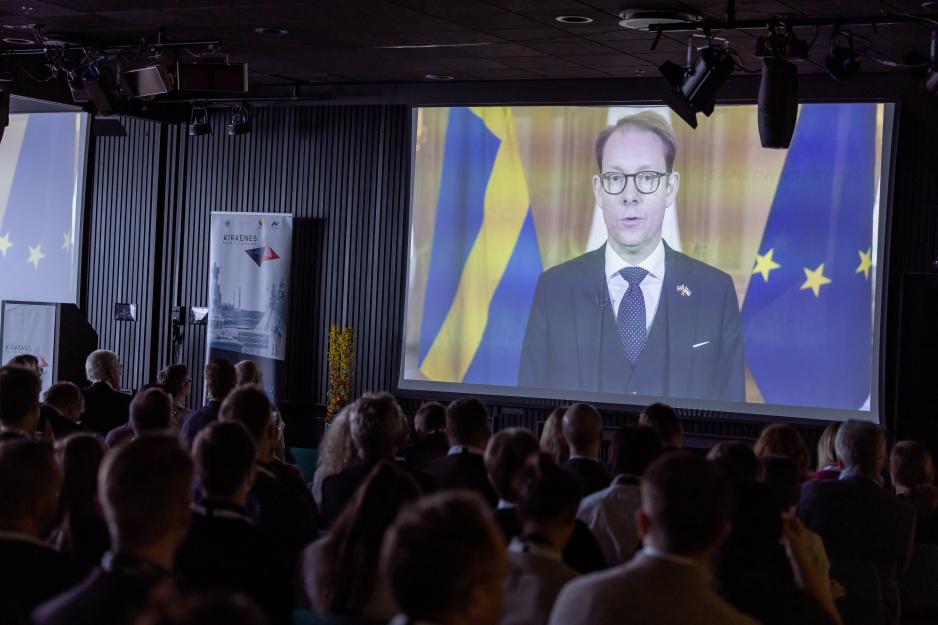
Sweden's MFA Tobias Billström also took place on the big screen during the Kirkenes Conference. (Photo: the Norwegian Barents Secretariat)
Outlines specific areas of focus
In the time coming, Billström wants the Barents cooperation to be further developed in three areas in particular.
"I see three areas in which there is a specific need for and major opportunities to strengthen our cooperation. The first is the climate and environment field. Climate change is one of our time's greatest challenges and it affects the Barents region with serious consequences for ecosystems, communities, and indigenous livelihoods. The recently adopted Nordic strategy for green industrial transformation, and the Barents climate action plan are important contributions to speeding up the environmentally friendly shift of our region," he says and continues:
"The other area of focus should be the people-to-people cooperation between the young people in our region. This builds long-term relationships, increases understanding, and provides enriching experiences. The youth platform developed by the Council of the Baltic Sea States is an important contribution to this purpose and we encourage young people in the Barents region to participate in this work."
"The protection of civil societies is a third central area. Cooperation in this area is important to be able to handle everything from new pandemics to natural disasters. The Barents rescue cooperation is also important. This work must be further strengthened," believes Billström.
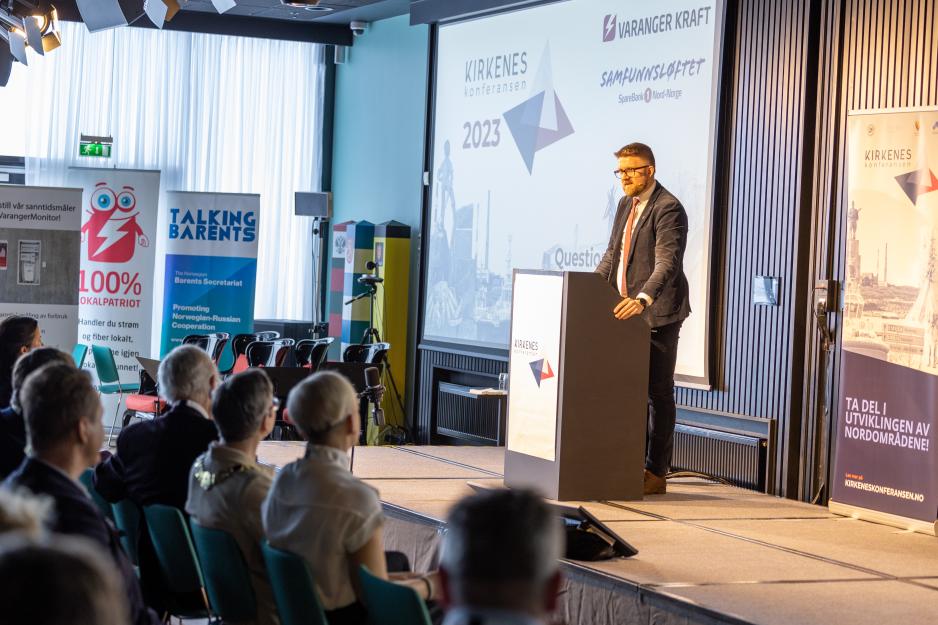
The Norwegian Barents Secretariat will remain, but with certain changes, states Eivind Vad Petersson, State Secretary of the Norwegian Ministry of Foreign Affairs, at the Kirkenes Conference. (Photo: the Norwegian Barents Secretariat)
Restructuring the Barents Secretariat
The Finnish chairmanship of the Barents Euro-Arctic Council has Norway's full support, expressed Eivind Vad Petersson (Labor), State Secretary of the Norwegian Ministry of Foreign Affairs, in his speech at the Kirkenes Conference.
He also informs that clarifications regarding the future of the Norwegian Barents Secretariat, which especially supports Norwegian-Russian interaction in the Barents region, will come in the near future.
"The Norwegian Barents Secretariat here in Kirkenes will certainly not be closed down, but it also cannot continue its work exactly as before. There will come important clarifications during the next month," says Vad Petersson.
The Barents Secretariat's leader, Lars Georg Fordal, could also speak about the dialogue that has begun with the Finnish and Swedish sides about the development of interaction.
"We have already started a constructive dialogue with Finland and Sweden on what we can cooperate on in the time coming. A joint challenge is that the youth is moving south and there is a need for new activity. We also wish to speed up the green shift. In addition, the change in Russia has created a major security problem that we and the Finns share, and there is a need to look at this together," says Fordal and continues:
"In other words, we have started conversations about doing specific things together. One example is the following: Before this conference, we arranged a meeting with around 40 Norwegian and Finnish businesses and representatives about how Finland can utilize the port in Kirkenes."
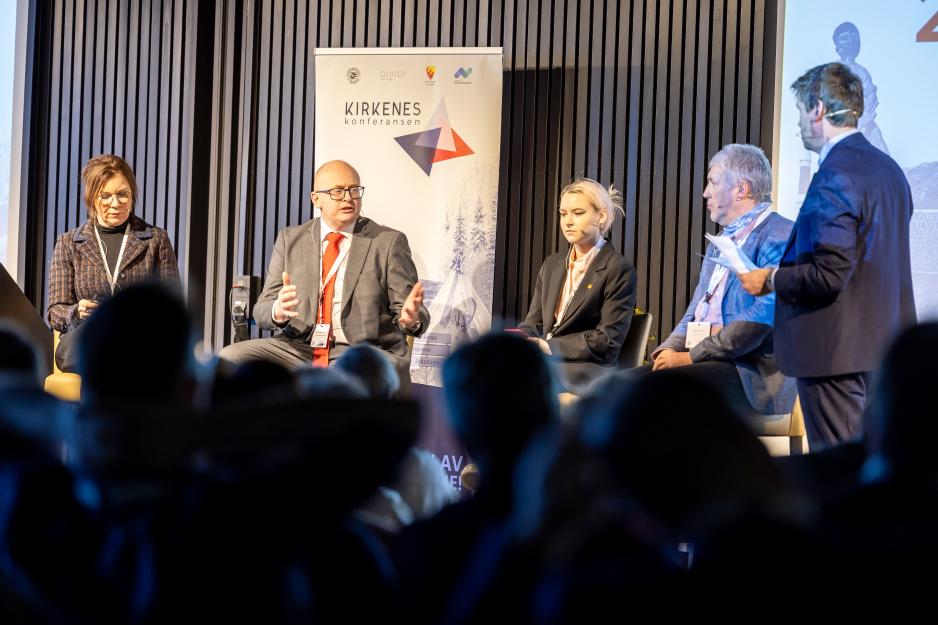
Restructuring the Barents Secretariat's work more in the direction of supporting Norwegian cooperation with the Finnish and Swedish sides has begun, says the secretariat's leader Lars Georg Fordal (number two from the left). (Photo: the Norwegian Barents Secretariat)
Facts about the Barents cooperation
– The Barents cooperation is a formalized collaboration primarily between Russia, Norway, Finland, and Sweden – designed to promote stability and sustainable development in a region that was characterized by military tension during the Cold War.
– The cooperation was established through the Kirkenes Declaration in 1993, stemming from a top-political process led by the MFA's in Norway and Russia – and a regional process with initiatives for business and cultural cooperation between northern counties in the two states. These two levels structure the cooperation.
– The Barents Euro-Arctic Council is the format for intergovernmental cooperation – which also includes Denmark, Iceland, and the EU as members. Nine countries have observer status. An international Barents Secretariat, established in Kirkenes in 2008, provides administrative assistance.
– The Barents Regional Council gathers 13 regional units in the four 'core countries' and representatives from the three indigenous peoples in the region – the Sàmi, Nenets, and Veps.
– There are several working groups under the council bodies, i.a. for health and social issues, environment, education and research, culture, indigenous affairs, and business.
– The Norwegian Barents Secretariat in Kirkenes has since 1993 supported Norwegian-Russian collaborations in the region through funding, sharing of knowledge, and networking.
– In March of 2022, all activities with public Russia within the Barents cooperation were suspended. The people-to-people cooperation with independent Russian actors remains. On the 1st of February, the Norwegian Barents Secretariat closed its three local offices in Russia.
Also read
This article was originally published in Norwegian and has been translated by Birgitte Annie Molid Martinussen.


